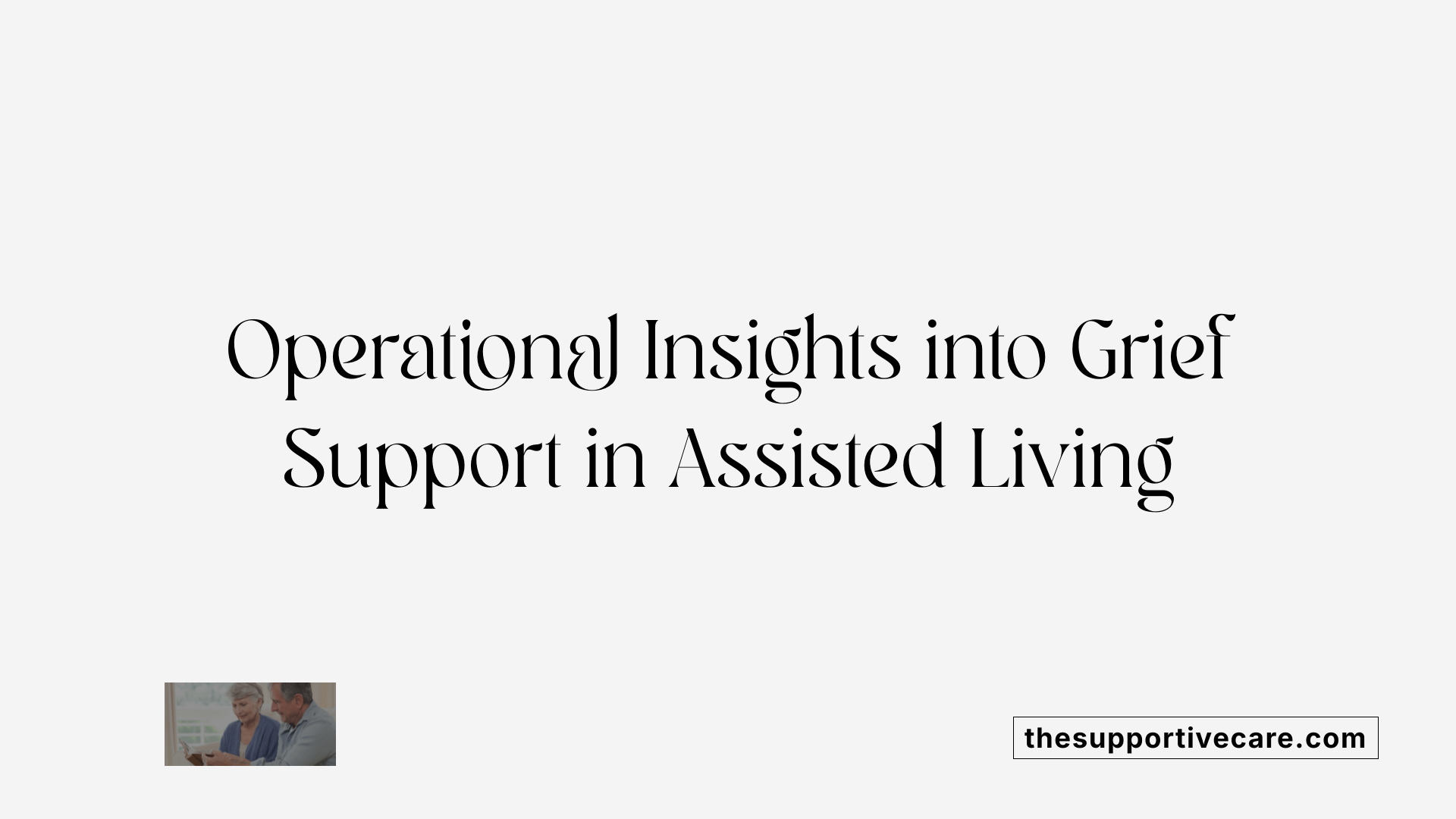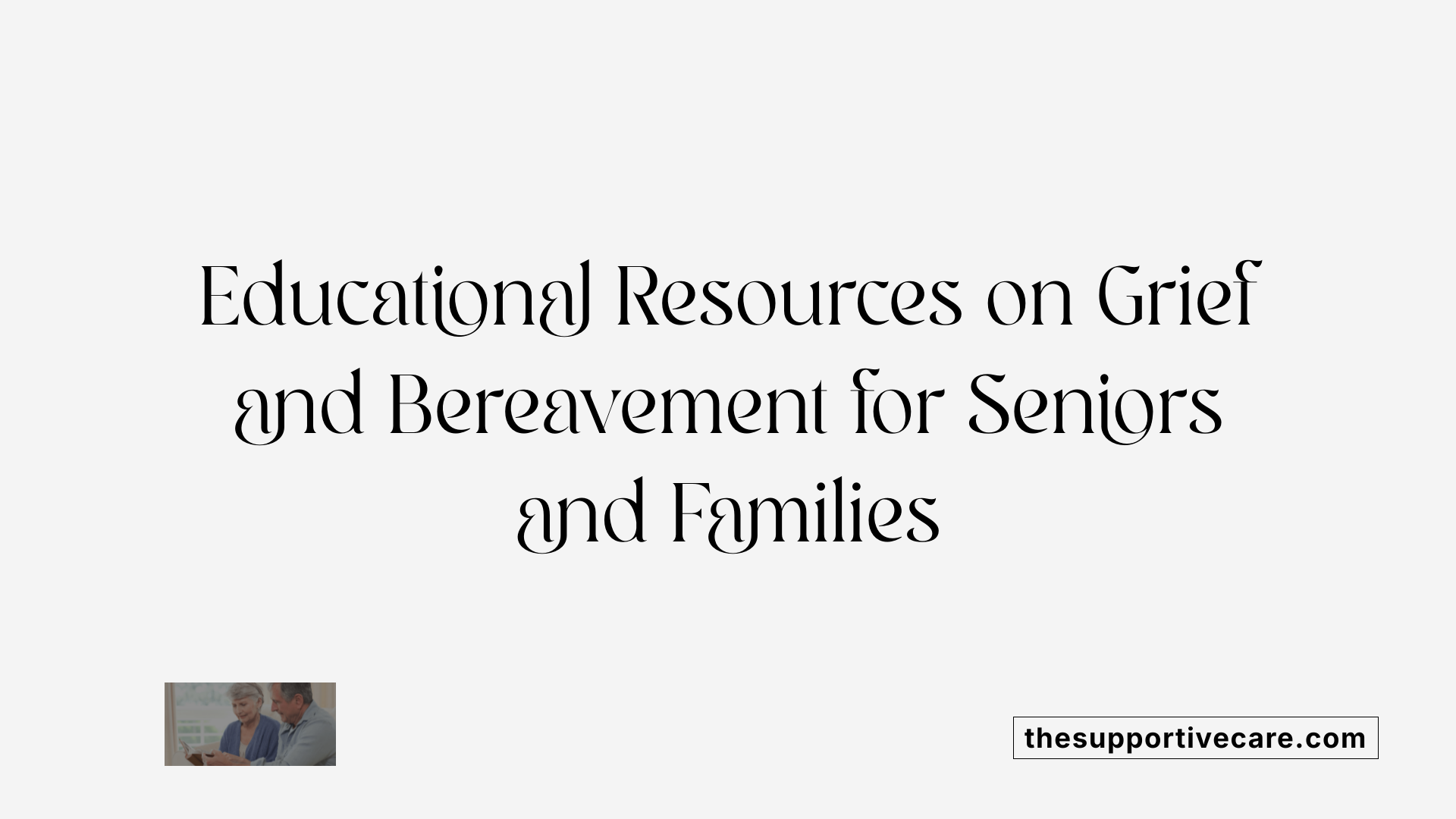Understanding Grief Support in Assisted Living Communities
Grief is a profound and complex experience, especially for seniors navigating multiple losses, health challenges, and social changes. Assisted living communities play a vital role in providing structured, compassionate support to help residents cope and find renewed purpose. This article explores the resources, structures, and best practices involved in facilitating effective grief support groups within these environments, emphasizing emotional healing, community engagement, and tailored support.
Overview of Resources and Support Opportunities for Seniors
 Assisted living communities offer a variety of grief support resources designed to help seniors cope with loss and emotional challenges. Local organizations such as the Senior Friendship Center play a significant role by providing dedicated support groups, counseling services, and educational programs tailored specifically for older adults. These services include therapeutic group sessions, one-on-one counseling, and workshops aimed at fostering emotional resilience.
Assisted living communities offer a variety of grief support resources designed to help seniors cope with loss and emotional challenges. Local organizations such as the Senior Friendship Center play a significant role by providing dedicated support groups, counseling services, and educational programs tailored specifically for older adults. These services include therapeutic group sessions, one-on-one counseling, and workshops aimed at fostering emotional resilience.
Support groups within these communities serve as safe spaces where seniors can openly share their experiences and feelings. Facilitated by trained professionals or spiritual care providers, these groups help members process their grief and build meaningful relationships with peers who understand their journey.
Organizations like MultiCare’s Hospice Bereavement Program and Seniors At Home supplement community efforts through outreach calls, community remembrance events, and customized education about grief and loss. These initiatives are crucial in reducing feelings of loneliness, promoting healing, and encouraging positive coping strategies.
Participation in these programs helps seniors manage complex emotions, remember loved ones constructively, and develop strength to move forward. By utilizing the available resources, elderly residents can experience a supportive environment conducive to healing and emotional well-being.
Structure and Types of Grief Support Groups in Senior Living Settings

What are the common structures and types of grief support groups in senior living settings?
In senior living communities, grief support groups are designed to provide a comforting and understanding environment for residents experiencing loss. These groups often come in two main forms: peer-led and professionally facilitated sessions.
Peer-led groups are run by residents or volunteers who have some experience with grief and can foster an atmosphere of shared understanding. In contrast, professionally facilitated groups involve trained counselors, social workers, or mental health experts who guide discussions and provide emotional support. Both types aim to create a safe space where participants can share memories, express feelings, and learn coping strategies.
Support groups may be structured in various formats. Some are open, allowing new members to join at any time, while others are closed, with a fixed group that meets over several weeks. Topic-specific groups may focus on particular issues such as spouse or partner loss, loss of a child, or even pet bereavement. These targeted groups help residents connect over common experiences.
Many programs incorporate faith-based or spiritual approaches, aligning with residents' beliefs to offer additional comfort. Therapeutic methods, such as reminiscence therapy and grief counseling, are also incorporated to address emotional and physical impacts.
Meeting formats vary, including in-person gatherings, online sessions, or hybrid models that combine both approaches. For example, organizations like GriefShare offer 13-week programs with a curriculum that includes video seminars, personal workbooks, and group discussions. These structured curricula provide information, normalize grief, and promote emotional healing.
Community activities such as remembrance ceremonies, journaling workshops, and meditation sessions often complement support groups, fostering a holistic approach to healing. These activities, along with professional counseling, aim to reduce loneliness, prevent depression, and strengthen community bonds among seniors.
In summary, senior living support groups are adaptable, diverse, and inclusive, designed to meet the varied needs of residents facing different kinds of loss. Their structured and compassionate approach helps residents navigate the difficult journey of grief, ultimately fostering resilience and connection.
Operational Aspects of Grief Support in Assisted Living Communities

How is grief support provided and operated within assisted living communities?
In assisted living communities, grief support is structured around comprehensive programs that involve both trained professionals and peers. Qualified staff such as counselors, social workers, and trained volunteers facilitate these services, ensuring that residents receive emotional and mental health support tailored to their unique needs.
Support groups, like the Transitions grief support group managed by social workers such as Pat Burgoyne at Regents Point, meet regularly to foster trust and openness among residents. These groups offer a safe space where individuals can share experiences, express feelings, and learn from others who are navigating similar losses.
Programs often include a variety of activities to aid emotional healing. These span group discussions, one-on-one counseling, remembrance ceremonies, and educational workshops that inform residents about grief processes and coping strategies. Spiritual and faith-based support are also integral parts of many programs, catering to residents’ spiritual needs.
Events such as memorial services and tribute activities serve to honor loved ones, helping residents maintain bonds and find comfort in shared memories. These activities not only facilitate remembrance but also reinforce a community atmosphere where residents support one another.
Creating a nurturing environment involves more than just formal programs. It includes fostering a caring, respectful atmosphere where staff and residents work together to address emotional, spiritual, and psychosocial needs. This holistic approach ensures that residents feel valued, understood, and supported throughout their grief journey.
Overall, the goal of grief support in assisted living is to help residents process their emotions, reduce isolation, and enhance resilience. By integrating professional guidance with peer support and community involvement, these communities promote emotional well-being and help seniors move forward with purpose and dignity.
Educational Resources and Support for Seniors and Families

What educational information is available on grief, bereavement, and emotional support services for seniors and their families?
Seniors and their families have access to extensive educational resources that help them understand and navigate grief and bereavement. These resources include printed pamphlets, workshops, seminars, and online materials designed to provide guidance on coping strategies and emotional resilience.
Organizations like the Centre for Living with Dying, Hospice of the Valley, and NAMI Santa Clara County are notable providers of tailored educational programs. They offer culturally sensitive materials, including bilingual booklets, to enhance accessibility for diverse communities.
Support programs cover a wide range of topics, such as managing emotions, understanding grief’s stages, and practical advice for mourning. Many organizations also offer retreats, online forums, and support groups where individuals can share experiences and gain peer support.
In addition to community-based services, government and health agencies publish comprehensive guides and toolkits. These educational materials target caregivers, families, and seniors, addressing legal considerations, mental health management, and effective mourning rituals.
By fostering understanding through these educational opportunities, these resources help reduce feelings of isolation, improve coping skills, and promote emotional well-being among seniors and those supporting them.
Resources and Support Overview
| Resource Type | Description | Target Audience |
|---|---|---|
| Pamphlets and Brochures | Information leaflets on grief, coping, and bereavement | Families, seniors, caregivers |
| Workshops and Seminars | Interactive sessions on emotional resilience and grief management | Community members, support groups |
| Online Forums and Retreats | Virtual spaces and dedicated retreats for shared healing | Seniors, families, support networks |
| Culturally Sensitive Materials | Bilingual booklets, culturally tailored content | Multicultural communities |
| Guides and Toolkits | Practical guides on legal, emotional, and health aspects | Caregivers, families, health professionals |
Search Tips for Further Exploration
For additional detailed materials, search for "Educational resources on grief and bereavement for seniors and families" to find local and national initiatives, community programs, and online support options tailored to varied needs. The availability of these resources significantly contributes to healthy grieving processes and strengthens community bonds.
Best Practices for Facilitating Effective Grief Support in Assisted Living Environments

What are best practices for facilitating effective grief support in assisted living environments?
Providing meaningful grief support in assisted living settings requires a thoughtful and compassionate approach that recognizes the individuality of each resident. A good starting point is to establish an environment that values empathy and respects cultural and spiritual diversity. Incorporating resources like bilingual materials or spiritual guidance ensures that residents feel seen and supported in their unique backgrounds.
Therapeutic activities play a vital role in helping residents process their grief. Reminiscence therapy, creative arts such as journaling or music, and mindfulness exercises can foster emotional expression and calmness. Rituals such as memorial services or legacy projects give residents opportunities to honor loved ones, fostering connection and purpose.
Open communication is crucial. Caregivers should maintain ongoing dialogues with residents and their families, providing clear information and emotional support. Forming interdisciplinary teams—including social workers, chaplains, and mental health professionals—ensures residents' needs are comprehensively addressed.
Early recognition of grief symptoms allows for timely intervention. Signs such as withdrawal, changes in sleep or appetite, or expressions of hopelessness should prompt supportive action. Participation in community rituals, such as remembrance events, helps normalize grief and reduces feelings of isolation.
Sustaining a compassionate environment also involves ongoing staff training. Educating caregivers on grief responses, cultural sensitivities, and effective communication skills ensures they are prepared to support residents and handle emotional challenges. Providing caregivers with regular support and resources prevents burnout and enhances overall care quality.
In summary, the most effective grief support strategies in assisted living combine personalized care, therapeutic engagement, open communication, community involvement, and continuous staff education. These practices foster resilience, promote healing, and cultivate a sense of belonging for residents navigating their grief journey.
Supporting Resilience and Compassionate Care
Providing grief support groups within assisted living communities is essential for fostering emotional healing, community connection, and resilience among residents. These programs, backed by professional resources, structured curricula, cultural sensitivity, and compassionate staff, address the multifaceted nature of grief. By integrating individualized approaches, community rituals, and ongoing education, assisted living facilities can create a supportive environment where seniors feel valued, understood, and empowered to move forward with hope and purpose.
References
- Grief Support Resources -
- Finding Grief Support for Parents in Senior Living ...
- Navigating Grief Together as a Community
- A GRIEF & BEREAVEMENT GUIDE FOR NURSING HOMES
- GriefShare: Need Help Dealing with Grief?
- Grief Support for Seniors: What is it and Why is it Important?
- Community Grief Education - Mt. Hood Hospice | Sandy OR
- Support & Strength: Dealing with Grief in Senior Life
- Guidelines for delivering bereavement support groups
- Coping with Loss: Bereavement Support for Seniors



































































































